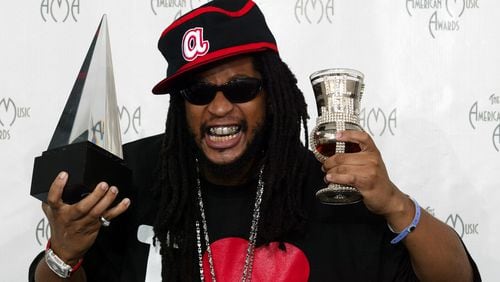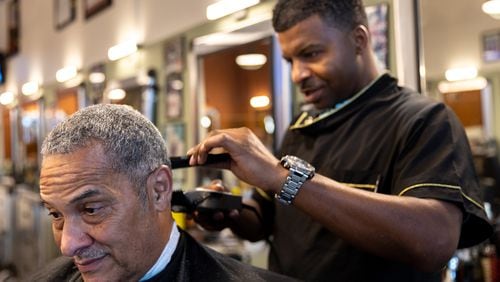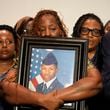Editor’s note: This article first published on Sept. 29, 2004. It was part of a series to celebrate hip-hop and the 25th anniversary of Sugarhill Gang’s “Rapper’s Delight,” the first rap single to crack the Top 40.
For most of its quarter century, hip-hop has treated Southern rappers like its country cousins.
Miami’s Luther “Luke” Campbell?
“Yeah, he makes good, bouncy strip-club music,” those in hip-hop’s birthplace, New York, would sniff. “But ‘Don’t stop! Get it! Get it!’ barked over and over again . . . not exactly great lyrics.”
Atlanta’s Lil Jon?
Same criticism.
“I even had the nerve to admit that I’m not a rapper,” says the frontman of trio Lil Jon & the East Side Boyz and the producer of such top rap singles as Petey Pablo’s “Freek-A-Leek,” the Ying Yang Twins’ “Salt Shaker” and his group’s own “Get Low.” “People really didn’t know how to take that --- because they’re always saying ‘hip-hop is about beats and lyrics. New York has the great lyricists.’ And they do . . . I’m just trying to represent for the guys in the back of the strip club acting crazy.
“Call that country if you want to.”
Luckily for the Lil Jons, Lukes and others below the Mason-Dixon Line, music lovers outside of New York liked the “country” sound. And now one of the last regions to get attention --- much less respect --- for its version of hip-hop has come to dominate the genre.
The first hip-hop group to win the music industry’s biggest honor --- Grammy’s album of the year --- was none other than Atlanta duo OutKast.
Arguably the biggest single of this year, “Yeah!” by Atlanta R&B singer Usher, was produced by Lil Jon and features local rapper Ludacris.
And on Billboard’s Top 10 rap chart this week, half of the titles include Southern artists.
“I remember when rappers used to almost be afraid to say that they were from the South,” recalls Atlanta music mogul Jermaine Dupri. Now, notes Kim Osorio, editor of New York-based Source magazine, “There’s no denying the Dirty South’s place at the hip-hop table.”
As hip-hop celebrates the 25th anniversary of its first major commercial release --- Sugarhill Gang’s “Rapper’s Delight” --- it’s a good time to note 25 key players in the South’s ascendance.
But first, some rules of eligibility: Popular artists like part-timer Nas, Mase, Da Brat and Too Short don’t qualify because while they live in the South, they tout hometowns New York, Chicago and Oakland in their records. Same goes for Atlanta-born Kanye West or Austin native Nelly. To be considered for this chronological list, rappers had to claim the South:
Luther “Luke” Campbell
In 1987, his became one of the first nationally known faces of Southern rap. The Miami resident drew ire for his graphic focus on the behind, but, in his many incarnations (2 Live Crew, Luke Skyywalker), he laid the foundation for today’s “crunk” sound with his 100 mph beats.
The D.O.C.
When West Coast gangster rap superstar Dr. Dre featured this Texas native on his 1992 classic “The Chronic,” it lent a whole new legitimacy to the Lone Star State.
Master P
More impressive for his business accomplishments than for the music he grunts over, this self-proclaimed “Ghetto Bill Gates” officially put himself and his beloved New Orleans on the hip-hop map when he launched the No Limit Records label in 1990.
Brian “Baby” Williams
He and his brother Ronald started their own New Orleans-based empire, Cash Money Records, in 1991, and claim to have put out more than 30 albums before the label got a $30 million distribution deal with Universal Records years later.
Jermaine Dupri
The Atlanta Convention and Visitors Bureau should be thanking this rapper-producer-record label president every day, not only for making a national hip-hop anthem out of his 2001 hit “Welcome to Atlanta,” but also for, in 1992, introducing the first multimillion-selling act from this city’s contemporary rap and R&B scene: Kris Kross.
Scarface
When he and his Geto Boys released “Mind Playing Tricks On Me” in 1992, hip-hop everywhere had to acknowledge this great, gruff storyteller from Houston.
Arrested Development
Though this rootsy ensemble claimed Atlanta as home, their 1992 debut “3 Years, 5 Months and 2 Days in the Life of . . .” uplifted listeners across the nation.
UGK
Texans Pimp C and Bun B spent their first seven years in relative obscurity. That all changed with B’s appearance on Jay-Z’s 1999 smash “Big Pimpin’.”
Eightball & MJG
The first act on Sean “P. Diddy” Combs’ Bad Boy South label actually directed hip-hop’s attention to Memphis way before the duo teamed with the New York starmaker. It helped launch Suave House Records in 1993 and released the underground classic “In Our Lifetime, Vol. 1″ six years later.
OutKast
Long before all the history-making Grammy glory --- in fact, from the moment Antwan “Big Boi” Patton and Andre “Dre” Benjamin hit the scene in 1994 --- they proudly represented their Atlanta roots, even helping to solidify one of the city’s nicknames by titling their 1996 CD “ATLiens.”
Goodie Mob
Stereotypically Southern and smart at the same time, Khujo, T-Mo, Gipp and Cee-Lo’s 1995 debut, “Soul Food,” made it hard for hip-hop audiences to take Atlanta lightly any longer. And it introduced yet another nickname for this region with the single “Dirty South.”
Missy Elliott
Though Queen Latifah is probably the best-known woman in hip-hop, this Virginia rapper-singer-writer-producer is the best of her sex in the business, from her first “hee-hee-hee-hee-how” on Gina Thompson’s 1996 single “The Things That You Do” until now.
Timbaland
One of the most creative producers ever to touch a drum machine --- much less make it sound really, wonderfully weird --- first saw success after working on the late Aaliyah’s 1996 CD “One In a Million” with fellow Virginia native Elliott.
Lil Jon
The Atlanta hip-hop scene’s own Horatio Alger toiled for years as a radio personality, A&R guy and independent-label artist. Now he’s getting attention not just for the kinetic tracks he’s been recording with the East Side Boyz since 1997, but also for producing two recent No. 1 pop singles (Usher’s “Yeah!” and Ciara’s “Goodies”).
Three 6 Mafia
Or Triple 6 Mafia, depending on what point you became familiar with the Memphis group. Triple 6 released its first major label album (“Chapter 2: World Domination”) in 1997 but became of major importance three years later when it made “Sippin’ on Some Syrup,” a concoction that supposedly had a gasoline base, actually sound enticing.
Ludacris
If you had to pick one hip-hop artist with the charisma to follow in fellow rapper Will Smith’s giant multimedia footsteps, it’s this guy. Of course there’s one huge caveat: From the Atlantan’s first appearance on the 1998 Timbaland single “Fat Rabbit,” he’s had his heels dug deep in X-rated territory.
Juvenile
Ever wonder where Missy Elliott got the delivery she uses on her infectious 2002 single “Work It”? Try the 1998 album “400 Degreez” by this New Orleans act. Specifically, his single “Back That [Thing] Up.” That and the album’s first hit, “Ha,” make him the most innovative rap artist from the Big Easy.
Trick Daddy
This gifted rhymer has been proudly representing Miami since his 1998 single “Nann” eked past regional borders.
Pastor Troy
As engaging a live performer as almost anyone in hip-hop, and more deserving of success than many of his better-known peers in “crunkdom,” this Atlanta dynamo has been a local favorite since his 1999 military chant “We Ready --- I Declare War.”
The Neptunes
Virginia Beach’s Pharrell Williams and Chad Hugo made their sometimes other-worldly productions work in a major way on Mystikal’s 2000 single “Shake Your [Behind],” followed by Jay-Z’s “I Just Wanna Love U (Give It 2 Me)” (2000), Busta Rhymes’ “Pass the Courvoisier” (2001) and Nelly’s “Hot In Herre” (2002).
T.I.
Another should-be megaseller, the self-anointed King of the South’s profile has grown thanks to his most recent jail stay and his feud with Houston’s Lil’ Flip. But his two solo CDs (2001′s “I’m Serious” and 2003′s “Trap Muzik”) merit attention.
Petey Pablo
This North Carolinian metaphorically swirled his home state’s flag around his head “like a helicopter!” on the 2001 single “Raise Up.” And his latest entry in the slang catalog, “Freek-A-Leek,” officially makes him more than a one-hit wonder.
Lil’ Flip
A champion of Houston’s underground “screwed” hip-hop scene, Flip made his major label debut in 2002 with the single “The Way We Ball.” Now he’s climbed as high as No. 2 on the pop charts with the single “Sunshine,” featuring Lea.
Young Buck
It would have been easy for 50 Cent’s cohort in G-Unit to claim New York, but ever since he raised his voice on Cent’s 2003 single “P.I.M.P.,” he didn’t deny his Tennessee origins --- even unabashedly titling his August 2004 solo debut “Straight Outta Cashville.”
David Banner
Who’d have thought an artist-producer out of little old Mississippi would have his 2003 single “Like A Pimp” referenced by Sean “P. Diddy” Combs (“Shake Ya Tailfeather”) and touted by top musician Ahmir “Questlove” Thompson of the Roots?
About the Author







